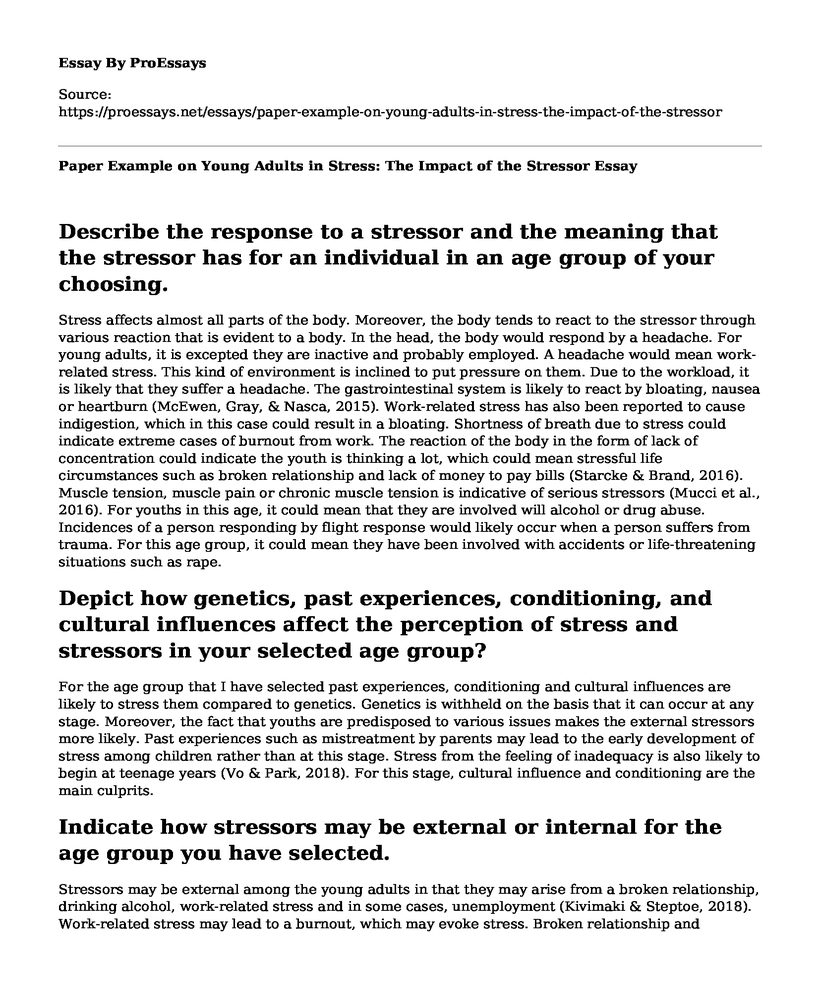Describe the response to a stressor and the meaning that the stressor has for an individual in an age group of your choosing.
Stress affects almost all parts of the body. Moreover, the body tends to react to the stressor through various reaction that is evident to a body. In the head, the body would respond by a headache. For young adults, it is excepted they are inactive and probably employed. A headache would mean work-related stress. This kind of environment is inclined to put pressure on them. Due to the workload, it is likely that they suffer a headache. The gastrointestinal system is likely to react by bloating, nausea or heartburn (McEwen, Gray, & Nasca, 2015). Work-related stress has also been reported to cause indigestion, which in this case could result in a bloating. Shortness of breath due to stress could indicate extreme cases of burnout from work. The reaction of the body in the form of lack of concentration could indicate the youth is thinking a lot, which could mean stressful life circumstances such as broken relationship and lack of money to pay bills (Starcke & Brand, 2016). Muscle tension, muscle pain or chronic muscle tension is indicative of serious stressors (Mucci et al., 2016). For youths in this age, it could mean that they are involved will alcohol or drug abuse. Incidences of a person responding by flight response would likely occur when a person suffers from trauma. For this age group, it could mean they have been involved with accidents or life-threatening situations such as rape.
Depict how genetics, past experiences, conditioning, and cultural influences affect the perception of stress and stressors in your selected age group?
For the age group that I have selected past experiences, conditioning and cultural influences are likely to stress them compared to genetics. Genetics is withheld on the basis that it can occur at any stage. Moreover, the fact that youths are predisposed to various issues makes the external stressors more likely. Past experiences such as mistreatment by parents may lead to the early development of stress among children rather than at this stage. Stress from the feeling of inadequacy is also likely to begin at teenage years (Vo & Park, 2018). For this stage, cultural influence and conditioning are the main culprits.
Indicate how stressors may be external or internal for the age group you have selected.
Stressors may be external among the young adults in that they may arise from a broken relationship, drinking alcohol, work-related stress and in some cases, unemployment (Kivimaki & Steptoe, 2018). Work-related stress may lead to a burnout, which may evoke stress. Broken relationship and unemployment could have the same effect in that they bring up the feeling of inadequacy that makes the victim spend a lot of time thinking (Vo & Park, 2018). This age group is prone to more external stressors than any other group though most are short-lived and can be tackled. The age group likely any other group is vulnerable to stressors from experiences of an accident which can be categorized as external
Describe how individuals may be more vulnerable to the effects of stressors at certain times.
Individuals are vulnerable to stressors when they come across things that trigger them (Mucci et al., 2016). For example, when a victim of rape meets the perpetrators, she or he might feel stressed. Moreover, when persons are subjected to pressure at the work environment, they may retire home with stress compared to the morning period. For those drinking alcohol, may trigger stress. In cases of a breaking or dysfunctional relationship, persons may feel stressed when communicating with their partners or when they behave in a certain way (Raposa, Laws & Ansell, 2016).
References
Kivimaki, M., & Steptoe, A. (2018). Effects of stress on the development and progression of cardiovascular disease. Nature Reviews Cardiology, 15(4), 215. Retrieved from https://www.nature.com/articles/nrcardio.2017.189
McEwen, B. S., Gray, J. D., & Nasca, C. (2015). Recognizing resilience: Learning from the effects of stress on the brain. Neurobiology of stress, 1, 1-11. doi.org/10.1016/j.ynstr.2014.09.001
Mucci, N., Giorgi, G., De Pasquale Ceratti, S., Fiz-Perez, J., Mucci, F., & Arcangeli, G. (2016). Anxiety, Stress-Related Factors, and Blood Pressure in Young Adults. Frontiers in Psychology, 7. doi:10.3389/fpsyg.2016.01682
Raposa, E. B., Laws, H. B., & Ansell, E. B. (2016). Prosocial behavior mitigates the negative effects of stress in everyday life. Clinical Psychological Science, 4(4), 691-698. doi.org/10.1177/2167702615611073
Starcke, K., & Brand, M. (2016). Effects of stress on decisions under uncertainty: A meta-analysis. Psychological bulletin, 142(9), 909. doi.org/10.1037/bul0000060
Vo, D. X., & Park, M. J. (2008). Stress and Stress Management Among Youth and Young Men. American Journal of Men's Health, 2(4), 353-366. doi:10.1177/1557988308325069
Cite this page
Paper Example on Young Adults in Stress: The Impact of the Stressor. (2023, Jan 10). Retrieved from https://proessays.net/essays/paper-example-on-young-adults-in-stress-the-impact-of-the-stressor
If you are the original author of this essay and no longer wish to have it published on the ProEssays website, please click below to request its removal:
- Essay Example on Social Workers' Ethics
- Women in Victorian England Essay
- Deviant Social Behavior - Essay Sample
- Essay Sample on Effect of ADHD on Child, Parents, and Siblings
- Parenting: Responsibility, Values and Character Building - Essay Sample
- Paper Sample on Early Parental Influences Shape Young Person's Sports Experience
- Paper Example on Gender & Sexuality: Cultural & Biological Differences







